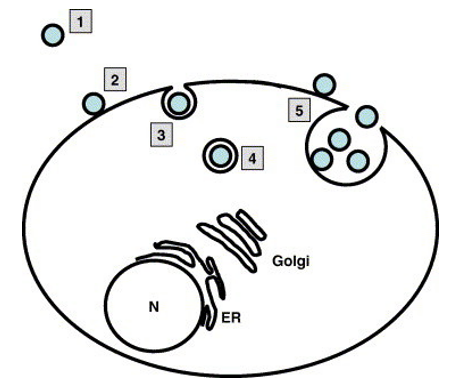Lipidomics of Host–Pathogen Interactions
Infectious diseases are a continuous burden on global health. AIDS, Malaria and Tuberculosis are the top three infectious diseases by scale of mortality. All of these infectious diseases are caused by intracellular pathogens, enveloped viruses, mycobacteria and eukaryotic parasites. The cell biology of intracellular pathogens (viruses, bacteria, eukaryotic parasites) has provided us with molecular information of host–pathogen interactions. As a result it is becoming increasingly evident that lipids play important roles at various stages of host–pathogen interactions. They act in first line recognition and host cell signaling during pathogen docking, invasion and intracellular trafficking. Lipid metabolism is a housekeeping function in energy homeostasis and biomembrane synthesis during pathogen replication and persistence.
 Fig1. Stages of host–pathogen interactions-1, Extracellular/free state; 2, docking; 3, invasion/uptake;
Fig1. Stages of host–pathogen interactions-1, Extracellular/free state; 2, docking; 3, invasion/uptake;
4, intracellular state/persistence/fusion/replication; 5, budding/escape from host cell (Wenk, Markus R, 2006)
Enveloped Viruses | Specialized membrane microdomains are entry portals for many intracellular pathogens. This is also the case for enveloped viruses, the majority of which enter via clathrin mediated endocytosis or caveolae/raft mediated uptake. The roles of lipids in these uptake processes has been studied intensively and phosphorylated forms of phosphatidylinositol (GPIns), the phosphoinositides (PIs), cholesterol and sphingomyelin have been critically implicated in clathrin and caveolae‐mediated endocytosis. There is growing evidence that lipids also play an important role in the regulation of the infection cycle of enveloped viruses, in particular during entry, packaging, and release from the host cell. |
Pathogenic Bacteria | Mycobacteria are intracellular pathogens that can invade and survive within host macrophages, thereby creating a major health problem worldwide. A study reports that cholesterol is essential for uptake of mycobacteria by macrophages. Cholesterol accumulated at the site of mycobacterial entry, and depleting plasma membrane cholesterol specifically inhibited mycobacterial uptake. Cholesterol also mediated the phagosomal association of TACO, a coat protein that prevents degradation of mycobacteria in lysosomes. |
Eukaryotic Parasites | As obligate intracellular pathogens Plasmodium and Toxoplasma are dependent on nutrient access. Phospholipid and neutral lipids are currently at a center stage of attention at intracellular stages of Toxoplasma but also of other parasites which feed small molecular metabolites from their hosts. Neutral lipids (triglycerides, sterols and sterol esters) are stored in 'lipid bodies' which are observed at the ultrastructural level as droplets both in the parasites as well as in the cytosol of the host. |
Many researches have been aimed in the lipid role of the host-pathogen relation specially modern lipidomic research field. The host-pathogen links are very complicated, energetic and include many successively and consequently steps of replication cycle. With decades of operational experience and technology platform, Creative Proteomics provides reliable, rapid, and cost-effective microorganisms lipidomics services based on LC-MS or shot-gun methods for host–pathogen interactions research.
Related Featured Services
How we work in 7 easy steps

If you have any questions about our lipidomics services for host–pathogen interactions research, please contact us. With our highly experienced scientific team, advanced techniques and equipment, we can tailor our services according to your needs.
References:
- Wenk, Markus R. Lipidomics of host–pathogen interactions. FEBS letters. 2006, 580.23: 5541-5551.
- Gatfield, John.; Jean Pieters. Essential role for cholesterol in entry of mycobacteria into macrophages. Science. 2000 288.5471: 1647-1651.
* Our services can only be used for research purposes and Not for clinical use.
Applications:


 Fig1. Stages of host–pathogen interactions-1, Extracellular/free state; 2, docking; 3, invasion/uptake;
Fig1. Stages of host–pathogen interactions-1, Extracellular/free state; 2, docking; 3, invasion/uptake; 